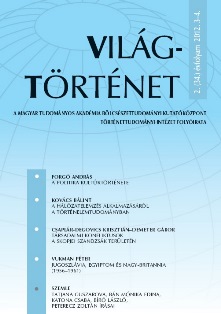Jugoszlávia, Egyiptom és Nagy-Britannia (1956–1961). A Foreign Office iratainak tükrében
Yugoslavia, Great Britain and Egypt, 1956–1961. An Analysis of Foreign Office Sources
Author(s): Péter VukmanSubject(s): History
Published by: Magyar Tudományos Akadémia Bölcsészettudományi Kutatóközpont Történettudományi Intézet
Summary/Abstract: The article analyzes Yugoslav–Egyptian foreign relations between 1956–61, and pays particular attention to its development, significance and usefulness for British foreign policy. From early 1955 on, British diplomats regularly reported on the meetings between Josip Broz Tito and Gamal Abdel Nasser and underlined the main points of the discussions, and their significance for British foreign policy in general, and British–Yugoslav and British–Egyptian foreign relations in particular. After the nationalization of the Suez Canal, Yugoslavia’s (non) participation at the subsequent London conferences and its role in the UN debate were of particular concern for Britain. As the diplomatic relations were broken between Britain and Egypt, Yugoslavia provided a useful source of information and played an important role in the normalization of British–Egyptian relations, offering its goodwill and mediation. British diplomats also regarded Yugoslavia as a useful intermediary, and sent messages to the Egyptians through Yugoslav diplomatic channels. Finally, the article analyzes the British perception of the preparation for the first congress of the non aligned nations in Belgrade and its preliminary congress in Cairo, both held in 1961.
Journal: Világtörténet
- Issue Year: 2012
- Issue No: 3-4
- Page Range: 289-301
- Page Count: 13
- Language: Hungarian

